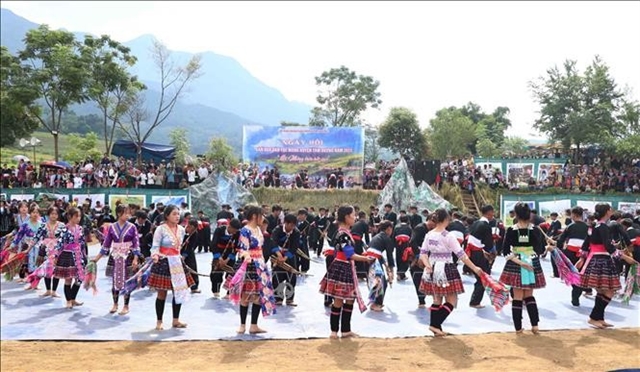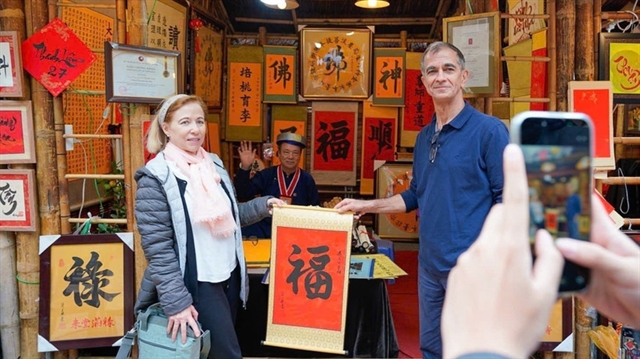 Society
Society
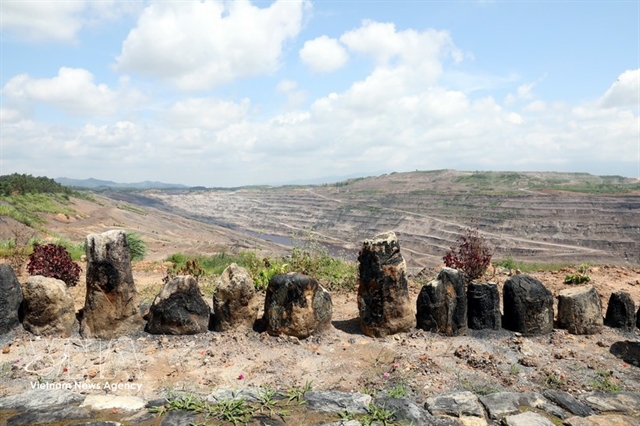
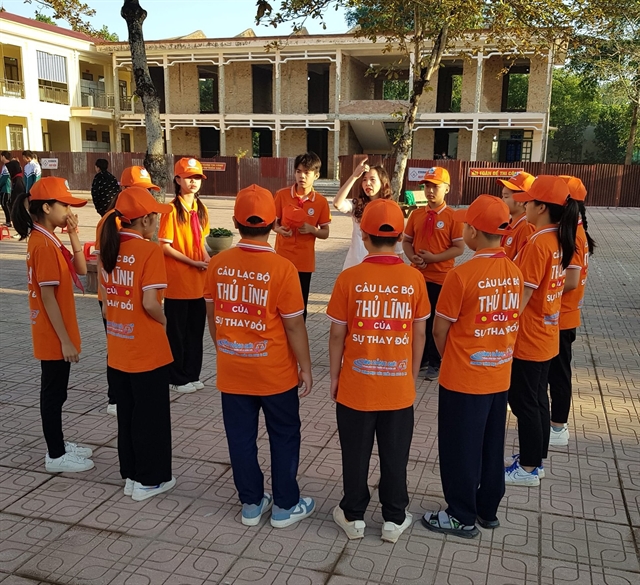 |
| A club session at Thanh Hà Secondary School in Hòa Bình. VNA/VNS Photo |
In Việt Nam’s mist-shrouded northern highlands, where red-earth roads twist through remote ethnic Mông villages and access to education remains a challenge, a quiet but determined movement is taking root among the youth.
'Leaders of Change' clubs, part of a government-backed initiative, are helping ethnic minority students discover their voice, develop life skills and become agents of change within their communities.
The clubs, launched under an initiative of the National Target Programme on Socio-Economic Development in Ethnic Minority and Mountainous Areas, are designed to promote gender equality and address critical issues affecting women and children.
Across provinces such as Hòa Bình, Yên Bái and Lào Cai, students are embracing leadership, learning to work collaboratively and addressing deep-seated cultural and social challenges.
"Initially I was worried, thinking I wasn’t confident or skilled enough to be a leader," says Hoàng Bảo Minh, an 8th grader at Thanh Hà Secondary School in Hòa Bình.
"But since joining the club, I feel like I’m maturing every day. Even small changes I make are the first steps towards being more responsible in my community."
Minh is among many students who entered the club with self-doubt, but soon gained confidence through activities like presenting ideas, participating in group discussions and entering media product competitions aimed at raising awareness about gender equality in ethnic and mountainous areas.
"I’ve learned how to work in teams, listen to others and take responsibility - not just for myself, but for those around me," he says.
Fellow student Bùi Tuyết Mai, in the same grade at the school, experienced a personal breakthrough while serving as a master of ceremonies at a large school event.
"At first, I was trembling. But holding the microphone, I didn’t just host - I stepped into a stronger version of myself. It wasn’t just about presenting; it was about finding a new image of who I could be."
Tuyết Mai says that the club helped her shed feelings of isolation. "I no longer see myself as just one person. I’m part of something bigger - an empowered group working towards good. I’ve also learned time management and how to overcome fear of public speaking," she says.
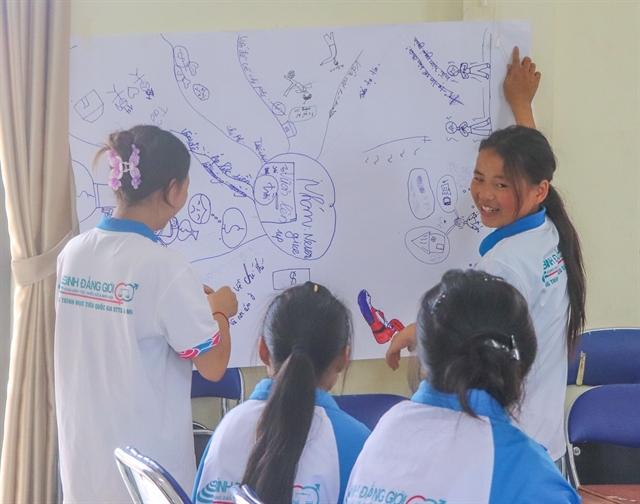 |
| Students share their views during a discussion at Suối Giàng Primary and Secondary School in Yên Bái. VNA/VNS Photo |
In Suối Giàng Commune of Yên Bái, where 98 per cent of the population is Mông and poverty remains widespread, students at Suối Giàng Primary and Secondary School face additional barriers.
Many lack academic support from home and live far from school, where gender bias and outdated customs persist. Yet, students like Giàng Thị Mai have emerged as young community advocates, sharing knowledge on reproductive health, children’s rights and traffic safety with their peers and families.
"We’re not waiting to grow up to do meaningful things," she says. "We start now, with small changes that sow seeds of hope."
Another student, Hảng Thị Thảo, echoes the sentiment. "I’m very happy and proud to be part of the club. Over two years, I’ve learned how to express my talents and protect myself and others," Thảo says.
Teachers and facilitators are central to the programme’s impact. At Thanh Hà Secondary School, Vice Principal Hoàng Thị Tuyết Chinh serves as the lead facilitator. She sees the club as more than an extracurricular activity; it is a safe space for students to learn and grow.
"At this age, students are emotionally sensitive but can also close themselves off," she says. "I try to create an environment where they feel trusted and empowered."
She recalls one student of Mường ethnicity who volunteered to play the bamboo flute during a contest hosted by the provincial Women’s Union.
"He told me afterwards that he was nervous, but our belief gave him the confidence to perform and inspire others. He has since graduated and is now studying at the Tây Bắc College of Culture and Arts."
What Chinh values most is not only the knowledge or skills students acquire, but their overall development. "They begin to ask questions, propose solutions and care about others. One student told me that previously, he only thought about himself. Now he wants to do something useful for everyone. That moved me deeply."
Looking ahead, Chinh hopes to expand the club to more schools, especially where soft skills programmes are lacking. She is also developing communication materials on gender equality and prejudice, and plans to organise teacher training and connect with education-focused organisations and youth volunteers for added support.
In Suối Giàng, club facilitator Đào Duy Hưng walks long distances to speak with parents about letting their children participate. Many students are family breadwinners, helping harvest tea or work in crop fields, which disrupts attendance.
"The language barrier is difficult. I’m not fluent in Mông language, but I believe sincerity can overcome all gaps," he says.
As a direct mentor, Hưng encourages students to discover their strengths through games, drawing, group discussions, skits and singing.
"I’m happy to see each child grow from shy glances to confident steps. I know I’ve played a small part in that," Hưng says.
He plans to broaden the club further. "I want to see the model expanded in the community and schools. These students will be the pioneers in changing mindsets, breaking gender stereotypes, and moving beyond outdated customs. They will become role models and communicators of positive change," Hưng says.
At Bắc Hà Secondary and High School in Lào Cai, one of the country’s most disadvantaged regions, the club is addressing significant gaps in rights awareness, life skills and safe spaces.
Nearly all students come from ethnic communities such as Mông, Phù Lá and Dao. Before the club’s formation, many students lacked exposure to basic rights and were reluctant to speak out due to language barriers and low self-esteem.
The club has since organised almost 30 sessions, including four special workshops, and engaged in district-wide exchanges with 74 students.
Six large-scale events have reached 2,500 students and parents on topics like road safety, online safety, school violence, child marriage and reproductive health. Two dialogue sessions brought together school leaders, local authorities, parents and students.
Creative formats like Zalo groups, social media pages, theatrical performances and participation in Women’s Union events have enhanced engagement. Since the club’s establishment, the number of students continuing to high school after grade 9 has increased to over 85 per cent. Child marriage and consanguineous marriages have reportedly declined sharply.
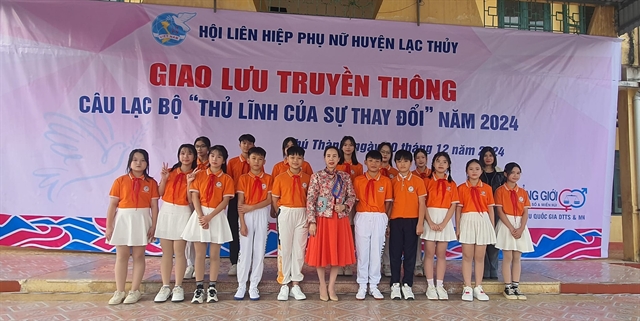 |
| Club facilitator Hoàng Thị Tuyết Chinh (centre) and club members at a communication event in 2024. — VNA/VNS Photo |
According to the Việt Nam Women’s Union, just over 2,000 'Leaders of Change' clubs have been established and maintained since 2021, drawing more than 121,000 ethnic children in 34 provinces.
The clubs focus on equipping children with essential knowledge and skills to study well, stay healthy and engage in family, school and community life. They also serve as forums where students can share ideas and grow more confident in expressing themselves to teachers, parents and peers.
In villages where life remains harsh and tradition can be limiting, students are now emerging as changemakers - sharing knowledge, standing on stage and raising their voices.
"With the guidance of dedicated teachers like Tuyết Chinh and Duy Hưng, these clubs are not only nurturing skills - they are cultivating hearts full of love and purpose,” a programme summary says.
From hesitant beginnings to confident steps, these 'leaders of change' are slowly blooming in Việt Nam’s highlands, one small voice at a time. VNS

